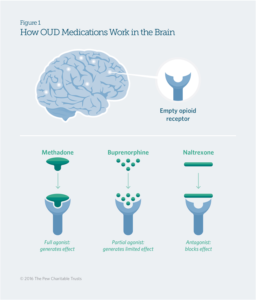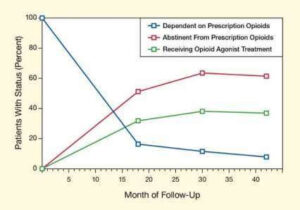In 2015, Michael Botticelli, the director for the Office of National Drug Control Policy stated:
“Medication-assisted treatment saves lives while increasing the chances a person will remain in treatment and learn the skills and build the networks necessary for long-term recovery.”[1]
So why is it that the use of medication-assisted treatment remains staggering and access is limited for those who need it?
When it comes to medication-assisted treatment, there is a whole host of misinformation and confusion surrounding its use and purpose, which leaves it rejected or ignored by the vast majority of treatment centers. Medication-assisted treatment is the use of legal, FDA-approved medications in combination with counseling and behavioral services provided by treatment professionals and family and peer support (Source: SAMHSA).
But for those who don’t understand the benefits or its place in treatment, it can seem simply as replacing one drug with another. Of course, that’s not the case for any accredited medication-assisted treatment programs, which is often the best option for some people looking to achieve long-term sobriety.
Here are a few of the debunked myths surrounding medication-assisted treatment.
MYTH: If you take medications like Suboxone, you aren’t really sober.
TRUTH: While it’s true that opioid replacements, such as Suboxone which contains Buprenorphine and Naloxone, act on the same receptors as heroin or an opioid, the medication attaches to these receptors but does not activate them, and also blocks other opioids from these receptors[2]. The combination of these two mechanisms helps control cravings in a person who is physically dependent on opiates without getting the person high.

MYTH: Medication-assisted treatment is for people who aren’t serious about their recovery.
TRUTH: In certain cases, even the most intensive counseling and behavioral treatments just aren’t enough to achieve sobriety and prevent relapses in the future. For these situations—particularly when opioids or severe alcohol use is involved—using medication-assisted treatment to neutralize the physiological effects may help someone attain this critical first step of recovery, allowing them to focus on the underlying issues and move forward in their recovery.
MYTH: It’s always better to just get people off of all drugs.
TRUTH: Although going “cold turkey” and just outright stopping the use of any substances is the ideal scenario for many, using medication-assisted treatment to ease the body away from its previous addiction can be both easier and medically necessary in some situations. “Ripping the bandage off” may seem preferable at the time, but it can also lead to complications, permanent damage, and even death if a person’s health is too fragile to handle the severity of the physiological repercussions.
MYTH: Medication-assisted treatment is just taking the easy way out.
TRUTH: If one accepts that addiction is a chronic disease, like diabetes or hypertension, then the use of medication should be understood to be a critical component of treatment in some cases. Like hypertension, if someone is able to address their condition by changing their lifestyle, such as their diet and physical activity, that is ideal; however, for some, that isn’t enough[3]. We wouldn’t shame someone with hypertension for taking Beta-blockers or ACE inhibitors, and addiction should be treated with the same understanding and compassion.
MYTH: People using medication-assisted treatment are less likely to stay sober.
TRUTH: When utilized correctly, medication-assisted treatment carries with it lower risk, and higher probability of success than solely doing counseling and behavioral services[4] for many people looking to address their addiction, stay in treatment[5], and remain sober for the long-term. One study found that patients who were still on an opioid agonist 18 months post-treatment, were twice as likely to be sober from opioid pain killers than those who were not (80% versus 36.6%).[6]
Figure Below. Abstinence Rate Exceeds 60 Percent in Long-Term Follow-Up of Medication-Assisted Therapy for Dependence on Opioid Pain Relievers Dependence on pain relievers dropped below 20 percent at 18 months, and below 10 percent at 42 months, after patients were stabilized on, and then tapered off, Bp/Nx. At all three follow-up points, patients who were currently engaged in opioid agonist therapy had markedly higher odds of positive outcomes. (Source: National Institute of Drug Abuse)

Like any form of treatment, medication-assisted treatment isn’t for everyone, and the decision to start these medications is made after consultation with a treatment team, and a thorough assessment is completed. If you’ve struggled with relapse and traditional treatment hasn’t worked for you, contact Roots Through Recovery or another certified provider to consult on whether it would be an appropriate course of action.
References:
[1] https://www.pewtrusts.org/en/research-and-analysis/fact-sheets/2016/11/medication-assisted-treatment-improves-outcomes-for-patients-with-opioid-use-disorder
https://obamawhitehouse.archives.gov/the-press-office/2015/09/17/remarks-ondcp-director-michael-botticelli
[2] https://www.naabt.org/faq_answers.cfm?ID=5
[3] https://archives.drugabuse.gov/publications/drug-abuse-addiction-one-americas-most-challenging-public-health-problems/addiction-chronic-disease
[4] https://www.asam.org/docs/default-source/practice-support/guidelines-and-consensus-docs/asam-national-practice-guideline-supplement.pdf?sfvrsn=24
[5] https://jamanetwork.com/journals/jamapsychiatry/fullarticle/209312
[6] https://www.drugabuse.gov/news-events/nida-notes/2015/11/long-term-follow-up-medication-assisted-treatment-addiction-to-pain-relievers-yields-cause-optimism




